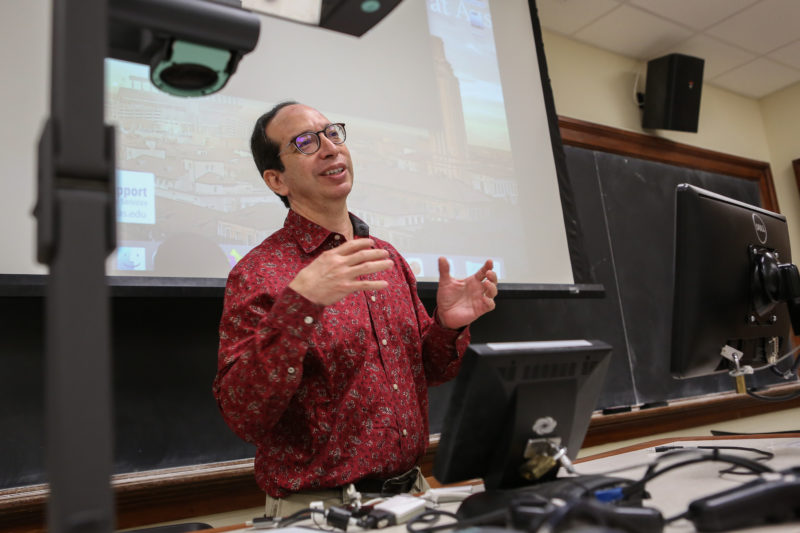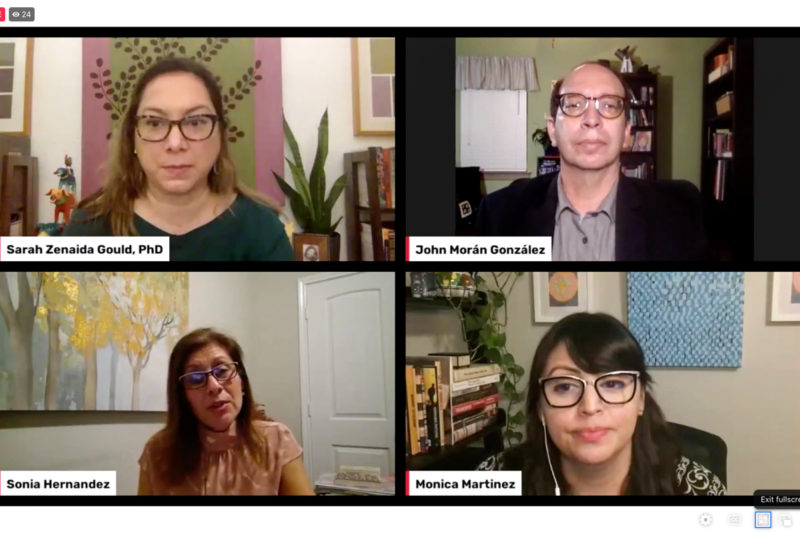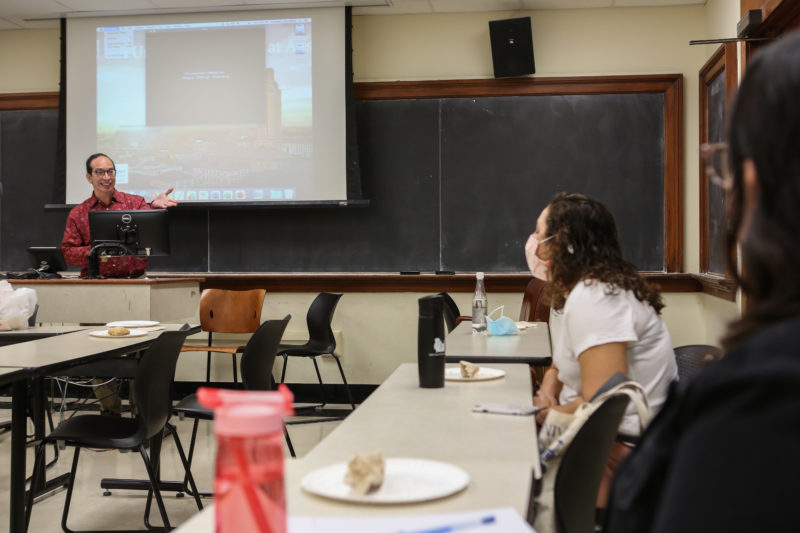Amid Texas Debate Over Teaching About Racism, ‘Refusing to Forget’ Soldiers On
By Andrew Logan
Reporting Texas

John Morán González, co-founder of Refusing to Forget and professor of American & English literature at the University of Texas at Austin, teaches his class on 19th century trans-American Latinx literature on Nov. 9, 2021. Founded in 2014, Refusing to Forget is a non-profit organization that has worked to increase awareness of racial violence aimed at Latino Texans throughout the early 20th century. Andrew Logan/Reporting Texas
In September 1915, Hidalgo County Commissioner Antonio Longoria and his father-in-law, Jesus Bazán, traveled to a Texas Ranger camp in the Rio Grande Valley to report a horse theft. Later that day, as the two community leaders traveled by horseback to their ranch, Texas Rangers Capt. Henry Ransom rounded up a posse and chased after them in a Ford Model T.
A gun emerged from the passenger-side window. Someone in the car aimed at Longoria and Bazán and shot them in the back, killing both.
Ransom ordered his fellow Rangers not to move the bodies, which decomposed on the side of the road. The men’s families dared not retrieve the bodies for fear of reprisal from the Rangers.
Longoria and Bazán had committed no crime, yet they were extrajudicially murdered based on the false pretense they were loyal to Mexican bandits in the area. They were not alone. Dozens of Mexicans and Mexican Americans were unlawfully killed in border counties by the Texas Rangers in what is known as the 1915 La Matanza, or The Massacre.
Since 2014, Refusing to Forget, a Texas-based nonprofit, has worked to increase awareness of such incidents of racial violence aimed at Latino Texans throughout the early 20th century.
The organization curated a groundbreaking exhibit at the Bob Bullock Texas State History Museum — the first time a state institution officially recognized state-sanctioned violence against ethnic Mexicans — and spearheaded the creation of four state historical markers recognizing under-told instances of racial violence. It also has created curricular materials for public school teachers. In 2021, the Organization of American Historians awarded Refusing to Forget its Friend of History Award for outstanding public presentation of American history outside of academia.
Now, with fierce debate raging over how Texas schools teach about racism, Refusing to Forget’s leadership says its mission is more important than ever. In June, Gov. Greg Abbott signed a law that critics say bans honest discussions of racism.
“Even though we’re in the midst of a battle to tell the real history to our children, it’s important for me to keep fighting, not for this politically correct fiction, but for the truth. History is both pretty and ugly,” said Sonia Hernández, co-founder of Refusing to Forget and Texas A&M University history professor. “As historians and as publicly engaged scholars, we have a responsibility to the larger public to share our evidence-based scholarship.”
In 2019, Refusing to Forget organized a two-day conference marking the centennial of the Canales Investigation, a 1919 legislative hearing that examined atrocities committed by the Texas Rangers yet ultimately absolved them of wrongdoing. After the conference, which was held at the Bob Bullock Texas State History Museum, members of Refusing to Forget considered dissolving the organization.
“We felt, well, we had at that point been going for five or six years. We had accomplished a lot: the exhibit, the conference, the various markers and unveiling,” said John Morán González, co-founder of Refusing to Forget and English literature professor at the University of Texas at Austin.
Then, in 2020, George Floyd was murdered by Minneapolis police, spurring a national reckoning of American racial injustice.
“We realized that we have some work left to do,” González said.

Sarah Zenaida Gould, executive director of the Mexican American Civil Rights Institute, hosts a virtual conversation with three members of Refusing to Forget, Sonia Hernández, John Morán González, and Monica Muñoz Martinez, in a Facebook livestream on Nov. 15, 2021. Andrew Logan/Reporting Texas
That work includes creating resources and materials to be used in K-12 classrooms, said Monica Muñoz Martinez, co-founder of Refusing to Forget and associate professor of history at UT.
“Every time we have a public history event, whether it’s in a public library or in a museum, or if we’re giving book talks … people ask, ‘When is this history going to be taught in public schools?’ ” said Martinez, who received a 2021 MacArthur Fellowship, also known as the “genius grant,” in part for her work with Refusing to Forget.
Refusing to Forget has created lesson plans for seventh-grade students about Jovita Idar, a civil rights pioneer in the early 20th century who fought for rights of Mexicans and Mexican Americans.
“Mexican American families have known these stories for generations,” said Sarah Zenaida Gould, executive director of the Mexican American Civil Rights Institute in San Antonio. “But then when you go to school, you don’t hear those stories, and in fact, I think for many families, there was an understanding that we don’t even talk about those stories outside of our family because our own safety may be at risk.”
Don Frazier, director of the Texas Center at Schreiner University, said Refusing to Forget has done “a nice job contextualizing fraught issues,” but he questions how the organization connects violence against Mexicans and Mexican Americans to white supremacy.
“In my opinion, this whole phrase of essentially trying to frame everything as white supremacy and not white supremacy is a new phenomenon,” he said. “I think it’s been safely adopted over the last few years probably as part of a trend line in journalism and sociology circles.
“The problem with the phrase (white supremacy) from where I’m standing is, in the old days, it meant people in hoods, burning crosses,” he added. “Now, it means, you know, anything that can drive a wedge between people racially or culturally.”
In September, Abbott appointed Frazier to the Texas 1836 Project Advisory Committee, which was established “to promote patriotic education and increase awareness of the Texas values,” according to the governor’s office.
Refusing to Forget is aiming to ramp up partnerships with teachers to help them understand what can and cannot be taught under Texas’ new law restricting discussions of race and racism in classrooms, Hernández said.

John Morán González, co-founder of Refusing to Forget and professor of American & English literature at the University of Texas at Austin, teaches his class on 19th century trans-American Latinx literature on Nov. 9, 2021. Andrew Logan/Reporting Texas
“How do we talk about Jovita Idar and how she stood up to basically white supremacy without calling it white supremacy?” she said.
All of this history is relevant to our modern political environment, she added.
“I think we need to be very careful with rhetoric we hear today among certain politicians, you know, like ‘dangerous,’ ‘murderers’ or ‘immigrants are here to cause harm,’ ” Hernández said.
“It’s not a big leap. We saw that in 2019 with the white supremacist who left Dallas to El Paso to kill, quote, ‘Mexicans’ — you know, that Walmart massacre,” she said. “This history is so relevant to our contemporary context.”
Over a hundred years had passed since the deaths of Antonio Longoria and Jesus Bazán but their memories were finally honored in 2017.
Refusing to Forget organized a ceremony to unveil the historical marker of the Matanza of 1915 in Cameron County in front of a crowd of local politicians, community members and descendants of those killed in the massacre.
Benjamin Johnson, a Refusing to Forget co-founder and professor of history at Loyola University Chicago, spoke at the commemoration.
“The demons of our past are still with us. The Ku Klux Klan parades in our streets, Angry men arm themselves in fear and hate against their neighbors. Our government again targets Mexicans as criminals and invaders. We need an honest history, for the living, now more than ever,” Johnson said. “This marker memorializes the unknown victims of the Matanza of 1915. We refuse to forget.”